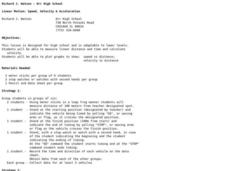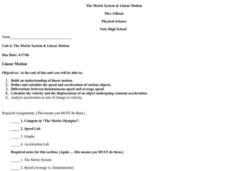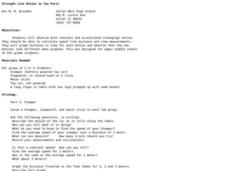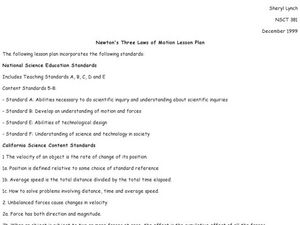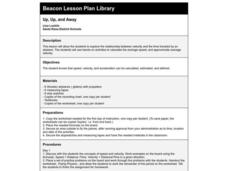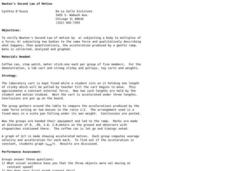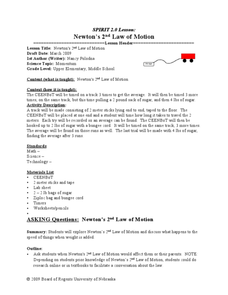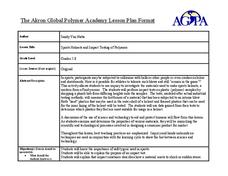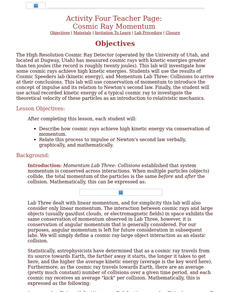Curated OER
Acceleration, Drag, Gravity, Motion, Forces, and Friction
Eighth graders build and run mousetrap cars in order to measure distance, time, and mass for their cars. They use these measurements to calculate average speed and kinetic energy, then create a slide show to visually explain how the car...
Curated OER
Motion: Speed, Velocity, Acceleration and Networking
Students interpret a variety of motion graphs. In this physics lesson, students calculate the speed and acceleration of objects using numerical data from graphs. They apply what they have learned to solve real world problems.
Curated OER
Linear Motion: Speed, Velocity & Acceleration
Students explore the concept of linear motion. For this linear motion lesson, students calculate distance and time in order to calculate average speed and velocity in the provided problems.
Curated OER
Linear Motion
Students are able to build an understanding of linear motion. They are able to define and calculate the speed and acceleration of various objects. Students are able to differentiate betweeen instantaneous speed and average speed. They...
Curated OER
Straight Line Motion in Two Parts
Young scholars describe and quantify the motion of toy cars. In this motion instructional activity, students observe a battery powered toy car on a flat surface and a standard toy car on a sloped surface. They write their observations,...
Curated OER
Take a Walk
Sixth graders graph acceleration and practice using the metric system. In this physics lesson, 6th graders take turns timing each other as they walk 15 meters. Students then chart and graph their data using the metric system.
Curated OER
I Feel The Need For Speed
Students are introduced to the concepts of speed, velocity, acceleration and inertia. In groups, they use the internet to research rollercoasters found in the United States and calculate their acceleration rates. They use the...
Curated OER
Inertial Mass, Weight, and Newton's Second Law of Motion
The stage is set for you to guide future physicists through three forceful activities about motion. In the first, learners experiment with rolling carts to discover how objects interact. In the second, they inspect images of an object in...
Curated OER
Straight Line Motion with a Stomper
Young scholars explore average speed, and graph distances and time. In this speed and velocity lesson students complete a lab then calculate distances, acceleration and velocity and graph the data.
Curated OER
Newton's Three Laws of Motion Lesson Plan
Students explore Newton's three laws of motion using a variety of activities. In this physics lesson, students calculate the average speed of a vehicle they constructed using distance and time information. They identify and draw the...
Curated OER
Up, Up, and Away
Students study the concepts of speed and velocity and complete practice problems. In small groups, students fly airplanes and record time and distance traveled for each flight. They calculate the speed and velocity of their plane for...
Curated OER
Can You Calculate the Speed of Your Pet?
Students analyze the formula for speed and velocity. They explore and demonstrate how to calculate the speed of wind up toy pets, average the speeds and identify the correct units of measure of speed.
Curated OER
Physics of Roller Coasters
Students design a roller coaster and demonstrate their knowledge of Potential and Kinetic Energy. They determine the average velocity a given marble travels on their roller coaster and apply their knowledge of various measurement systems...
Curated OER
TE Activity: Heavy Helicopters
Students study the concepts of weight and drag while making paper helicopters. They measure how adding more weight to the helicopter changes the time for the helicopter to fall to the ground. They apply what they examine to the work of...
Curated OER
Newton's Second Law of Motion
Sixth graders study Newton's second law of motion and verify it. In this force and motion lesson students complete a lab activity and collect data, analyze it and graph it.
Curated OER
I'm Inclined to See
Students examine motion of a sphere on an inclined plane. In this inclined plane lesson plan students complete an activity to discover basic relationships.
Curated OER
Newton's 2nd Law of Motion
Students investigate how mass affects the speed of an object. In this physics lesson, students record data on the data table and graph results. They analyze findings and formulate a conclusion.
Alabama Learning Exchange
Energy and Work Amusement Park Style
Students distinguish between kinetic and potential energy. They recognize that energy can change from one form to other forms. They identify and describe several forms of energy.
Curated OER
Sports Helmets and Impact Testing of Polymers
Students examine the importance of good quality safety gear. In this investigative lesson, students will tests various polymers, collect data, and analyze the data to determine which polymer is best for safety helmets. They will design a...
Curated OER
Mathematics Module
Delve into graphing! The concepts covered begin with basic graphing basic coordinates and algebraic expressions on coordinate planes, and build up to graphing linear inequalities and equations. Learners solve and simplify various...
Curated OER
Cosmic Ray Momentum
Students describe how cosmic rays achieve high kinetic energy via conservation of momentum.


